|
|
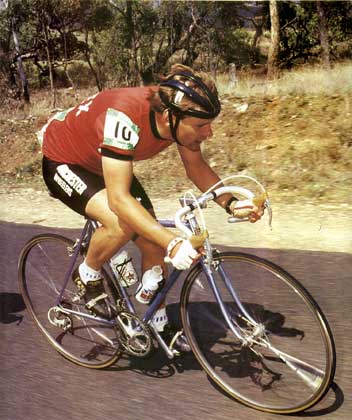 IN
a magnificent ride which shattered by nearly 23 minutes the race record set
in 1968, Manchester Wheelers' Paul Curran won the Grafton to Inverell Classic
in Australia.
IN
a magnificent ride which shattered by nearly 23 minutes the race record set
in 1968, Manchester Wheelers' Paul Curran won the Grafton to Inverell Classic
in Australia.
The 228 kilometeres race, from the flat coastal plains, over the 3,600 feet Mt Gibraltar Range to the inland city of Inverell, was the first major event for the British team in its month-long racing trip to Australasia.
The team of Curran, Dave Mann, Alan Gornall and John Tonks, with manager Geoff Shergold, had arrived in Australia just a week prior to the tough mountain race and had already competed in two criteriums in the days preceding the Grafton race, along with other international teams in Australia for the Brisbane to Sydney tour.
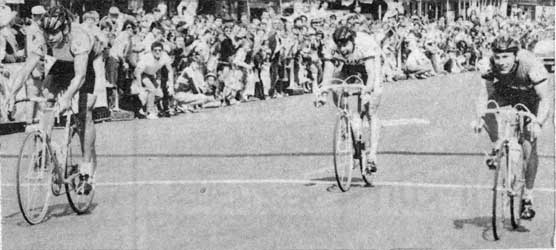 Bad
luck had struck Dave Mann in the second criterium, in the northern NSW coastal
resort of Coffs Harbour, just two days prior to the Grafton-Inverell. A spectator
had walked in front of him and he fell heavily, so that on the line at Grafton
he looked as if he had been the loser in a boxing match, with a blackened right
eye and lacerated, swollen face. But Mann was to figure in a long break and
eventually finished in seventh place.
Bad
luck had struck Dave Mann in the second criterium, in the northern NSW coastal
resort of Coffs Harbour, just two days prior to the Grafton-Inverell. A spectator
had walked in front of him and he fell heavily, so that on the line at Grafton
he looked as if he had been the loser in a boxing match, with a blackened right
eye and lacerated, swollen face. But Mann was to figure in a long break and
eventually finished in seventh place.
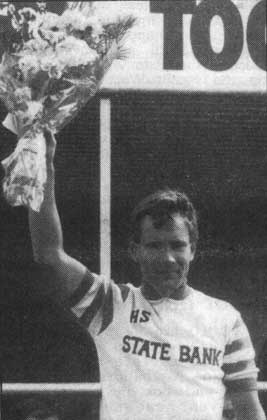 The
Grafton to Inverell this year had special significance as it was the 25th year
for a race which had grown from a small country event to become Australia's
richest one-day race, as well as the longest amateur classic. A field of 66
riders, including 28 from overseas, faced the starter in the first category
event. Energetic race director Jack Griffin, an Inverell cycle shop proprietor,
had worked with his small group of four local volunteers to raise £19,000
in sponsorship money and the first-category riders were competing for £6,000.
The
Grafton to Inverell this year had special significance as it was the 25th year
for a race which had grown from a small country event to become Australia's
richest one-day race, as well as the longest amateur classic. A field of 66
riders, including 28 from overseas, faced the starter in the first category
event. Energetic race director Jack Griffin, an Inverell cycle shop proprietor,
had worked with his small group of four local volunteers to raise £19,000
in sponsorship money and the first-category riders were competing for £6,000.
The race started in cool conditions before a large crowd in the wide flat streets of Grafton but within five kilometres of the start an incident took place which was eerily similar to the fiasco which took place on the first day of last year's Brisbane to Sydney tour. With the field using the whole road to obtain the best riding conditions in the slight crosswind, the leading police car, manned by a local, small town police crew, pulled across the road and stopped the race for a couple of minutes.
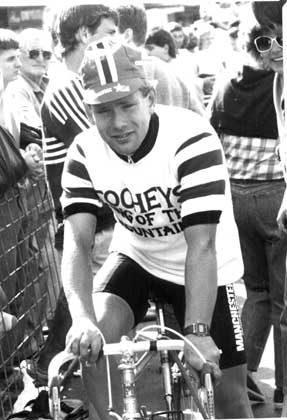 The
officer in charge reminded riders of the road rules and then the race restarted.
Within a few kilometres the field was back across the road on a few occasions
and the officer apparently decided not to pursue the same course of action again,
on what is a relatively quiet road, and the race proceeded smoothly for the
remaining distance.
The
officer in charge reminded riders of the road rules and then the race restarted.
Within a few kilometres the field was back across the road on a few occasions
and the officer apparently decided not to pursue the same course of action again,
on what is a relatively quiet road, and the race proceeded smoothly for the
remaining distance.
About eight kilometres before the foot of the Gibraltar Range Paul Curran opened a gap and began the 17 km, 3,200 feet climb with 45 seconds advantage over the bunch. By the halfway point of the climb the bunch had split as the strong climbers applied pressure and Olympic gold medallists Kevin Nichols, Dean Woods and Michael Turtur were three of those dropped by the bunch, along with England's Alan Gornall and South Australian Alan Gill, a former Australian road champion and winner of this race in 1981.
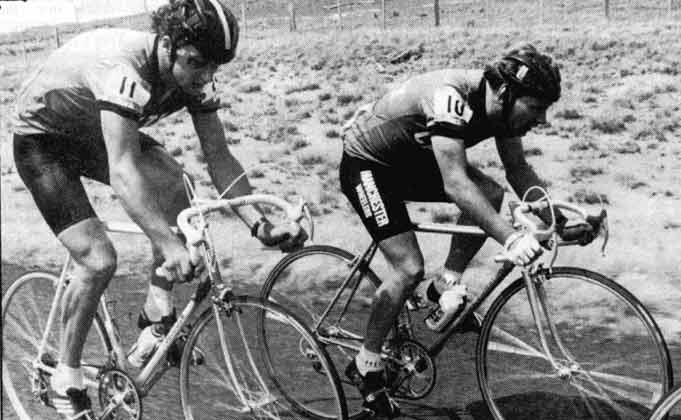 Then,
surprisingly, Australian Olympian Michael Lynch, 1984 Grafton winner and winner
of two major Australian tours this year, was off the bunch and struggling in
his lowest gear of 42 by 18. He had expressed confidence before the start but
his hopes for victory vanished as the gap to the leaders widened. He was further
demoralised as John Tonks caught him, twiddling his 42 by 20 and making it look
easy as he pursued the bunch, with Lynch unable to stay with him
Then,
surprisingly, Australian Olympian Michael Lynch, 1984 Grafton winner and winner
of two major Australian tours this year, was off the bunch and struggling in
his lowest gear of 42 by 18. He had expressed confidence before the start but
his hopes for victory vanished as the gap to the leaders widened. He was further
demoralised as John Tonks caught him, twiddling his 42 by 20 and making it look
easy as he pursued the bunch, with Lynch unable to stay with him
Lynch later joined forces with Gill, strong Australian Geoff Skaines and German Marcus Hess but he finished well down in 34th place.
Three quarters of the way up the mountain Curran still held a 30 seconds lead, disadvantaged to some degree by not knowing how many more kilometres of the climb remained. As I rode alongside him on the motorcycle to inform him of his time gap and of the distance remaining, he was still climbing smoothly and looking quite strong.
Then, in the last few kilometres, strong riding at the front of the bunch by the Swiss team brought the remnants of the bunch up to the small Englishman. Nature was kind to the riders on the climb this year as conditions were quite cool and there was very little wind, whereas usually the heat on the climb and a westerly wind thereafter can decimate the field. Slightly before the King of the Mountains sprint at the Gibraltar summit Curran moved about 100 metres clear of the bunch, in company with Swiss rider Michel Ansermet, with Curran taking the sprint.
Dave Mann and another Swiss, Thomas Wegmuller, opened up a slight gap on the bunch of around 30 riders, and as this pair crested the summit and began the slight downhill run to Ranger's Lodge they quicked their pace and joined the two leaders. There was no discernible reaction from the bunch, in which the feeling may have been that such a break would be brought back with 140 kilometres still remaining and with top Australians such as Graham Seers, Eddie Salas and Stephen Fairless still in the bunch to give chase when the occasion arose.
But within 15 kilometres, before the King of the Mountains sprint at Softwood (103 kms), Lars Wahlqvist of Sweden had jumped across the gap and the five breakaways were moving further ahead and working together very smoothly. Dave Mann took the sprint at Mt. Mitchell, (120 kms), and as the five headed for the highest point on the road at 3,800 feet they had a 1-45 seconds lead which stretched to 2-45 before Glen Innes.
A crowd of around 2,000 had gathered in Glen Innes (140 km) the only town on the race route, where Ansermet took the town sprint from Mann. The lack of any real pursuit from the remnants of the field, now split into two main bunches, allowed the leaders to maintain a lead of two minutes as they approached the hard climb of the Waterloo Range, with 55 kilometres to go.
On this climb Dave Mann lost contact and was advised by team manager Shergold to wait for the chasers rather than dangle between the two groups. After the Waterloo Range, with Seers and tall Australians Rik McCorkell, the 1983 winner, and Stephen Fairless stirring the bunch of 12 riders which had gone well clear of the remainder of the field, the gap to the leaders dropped to 1-30, but then the leading quartet stepped up the tempo and stretched the advantage to 1-42 with the terrain much easier as the road descends from the 3,700 feet altitude of the Waterloo summit to the 2,000 feet altitude of Inverell.
The last real obstacle on the route is the short, sharp climb of Wire Gully, the last King of the Mountains sprint, just 23 kilometres from the finish and Curran took the sprint as easily as he had taken the Waterloo sprint, later admitting to me that he had not realised there was a King of the Mountains sprint at the top of the gully.
Curran was clear of his three companions at the summit and he tried to go on with the effort but the two Swiss gave chase and brought him back, with Wahlqvist the Swede making a big effort to regain contact.
Then, 1-45 later, Seers and Norwegian Join Skaane, topped the climb just clear of the remaining 10.
But it was too late, with these two being brought back within a few hundred metres and it was obvious that a superhuman effort would be needed.
On a long, straight stretch with just 15 km remaining I looked back from my vantage point beside the leaders and could see the pursuers coming into view, but they must have known it was a hopeless task ahead of them. With 10 km remaining Curran looked very strong, after having gone through a couple of bad patches earlier on, but it was obvious that the two Swiss would make it very hard for him in a sprint finish. The last couple of kilometres into the finish on the wide main street of Inverell were lined with a crowd estimated at 6,000.
With 500 metres left it was impossible to pick a winner, but then bad luck eliminated Thomas Wegmuller as he pulled his foot out of the pedal.
With 100 metres left Ansermet was in front, with Wahlqvist on his wheel and Curran winding up his big gear and closing fast on his left. At the line it was almost a photo-finish but Curran had taken the race by less than half a wheel from Ansermet, with Wahlqvist third and a disappointed Wegmuller fourth.
One minute three seconds later Ric McCorkell crossed the line, having made a valiant effort in the last 10 kilometres, leaving the remnants of the bunch behind by 58 seconds. Graham Seers led them in to take sixth place, just ahead of Dave Mann, in a creditable seventh place. Curran's time was 6 hours and 49 seconds and had there not been any police stoppage the race would have been ridden in under six hours, a remarkable time considering the terrain.
Paul expressed surprise that he had won, as he had thought he may finish third or fourth due to his lack of a fast road sprint, but he had been able to wind his gear up on the slight downhill finish.
Interestingly, Curran had ridden almost the whole race with a spoke in his back wheel broken near the hub. The spoke had broken only 20 kms from the start but the wheel was still true at the finish, a tribute to the wheelbuilder.
Although England finished second to Switzerland in the teams classification the English riders took away the lion's share of the prize-money.
1. PAUL CURRAN (Great Britain) 228km in 6-0.49
2. Michael Ansermet (Switz)
3. Lars Wahlqvist (Swed)
4. Thomas Wegmuller (Switz) all st
5. Richard McCorkell (Aus) at 1-3
6. Graham Seers (Aus) at 2-1
7. Dave Mann (GB)
8. Mike Maue (WG)
9. Stephen Fairless (Aus)
10. Paul Rugari (Aus) all st
Toohey's King of the Mountains: Paul Curran (GB).